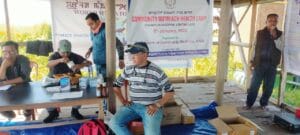Around 52 villagers, including 27 men and 25 women, were treated during the one-day health camp. Medicine for the children in the floating village was also provided free of cost by the visiting medical practitioners, the team comprising of Dr Homendro, Dr Ranchandra, Dr Pearson, Dr Anirban and Dr Mani from the Department of Community Medicine, RIMS.
TFM Report
A one-day health camp under the Community Extension Program of the Department of Community Medicine, Regional Institute of Medical Sciences (RIMS), Imphal, was held at Champu Khangpok Floating Island Village within Loktak Lake on Sunday.
A team of medical practitioners from the Department of Community Medicine, RIMS volunteered their service for the marginalized fishing community settled at the floating island village to treat ailments primarily of water-related illnesses and physical strains.
An approximate number of 52 villagers, including 27 men and 25 women, were treated during the one-day health camp. Medicine for the children in the floating village was also provided free of cost by the visiting medical practitioners, the team comprising of Dr Homendro, Dr Ranchandra, Dr Pearson, Dr Anirban and Dr Mani from the Department of Community Medicine, RIMS.
The team of doctors was supported in the health camp by volunteers and members of the Champu Khangpok Floating Island Village Welfare Committee.
It may be recalled that the fishers population living in shelter huts ‘Phumshang’ at Champu Khangpok have repeatedly complained of water-related illnesses during these past years due to the deteriorating condition of the water quality in Loktak Lake, induced by factors like accelerating pollutant deposits from upstream urban pockets particularly Imphal city, the reported rate of eutrophication, and the profusion of invasive alien species of aquatic and semi-terrestrial plants.
Sunday’s health camp also featured a side event of awareness on Conservation of Wetlands and Water Bodies as part of the Freshwater Ichthyology and Sustainable Aquaculture (FISA) conducted by a three-member team lead by Dr Rameshori Yumnam, Assistant Professor at the Department of Zoology, Manipur University. Dr Rameshori was assisted by her doctoral students Rebika Akoijam and Somirin Varam from the department.

Sharing her field experience during the visit within Loktak Lake, Dr Rameshori opined that the water quality of the lake is in a fairly deteriorated condition, evident by the physical characteristics of muddy appearance resulting from possible high rate of siltation, pollutant loads and the absence of submergence aquatic plants that helps in the water purification while providing feed for the aquatic life.
Salam Rajesh, conservation practitioner, also attending the program shared Dr Rameshori’s concerns on the deteriorating water quality of the lake and supplemented that the high incidence of the fishers suffering from different water-related illnesses may be due to the unhygienic characteristics of the Loktak water body.
A Ramsar site of international importance, Loktak Lake is presently suffering from various ailments including anthropogenic influences such as rampant encroachments, direct deposits of domestic and commercial wastes into the water body, chemical residues from surface run-off from the nearby agricultural fields, and high rate of siltation induced by soil erosion from extensive deforestation in the catchment hills.
